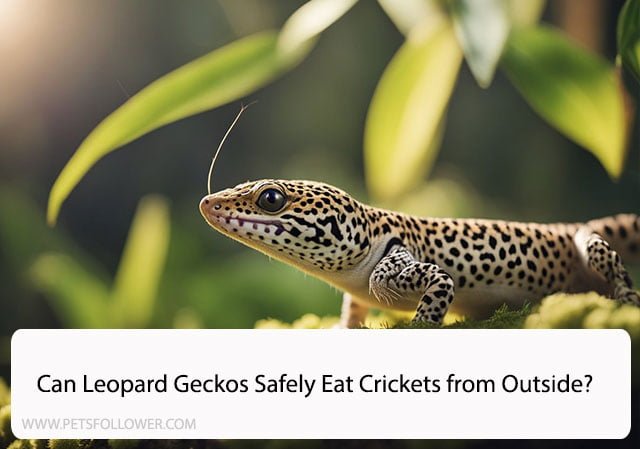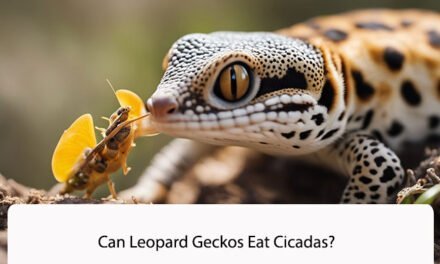Leopard geckos are fascinating creatures that make great pets. As with any pet, it is important to ensure that they are fed a healthy and balanced diet. One of the most common foods for leopard geckos are crickets. However, many pet owners wonder if it is safe for their geckos to eat crickets from outside.

In short, the answer is no. It is not recommended to feed your leopard gecko crickets from outside. This is because wild crickets may carry parasites or diseases that can be harmful to your gecko. Additionally, wild crickets may have been exposed to pesticides or other chemicals that can also be harmful to your pet. Therefore, it is best to purchase crickets from a reputable pet store or breeder that can ensure they are safe and healthy for your leopard gecko to eat.
Understanding Leopard Geckos’ Diet

Leopard geckos are insectivores, which means they feed on insects. In the wild, they hunt for insects such as crickets, mealworms, and roaches. In captivity, they can be fed a variety of commercially available insects, including crickets, mealworms, superworms, and waxworms.
Nutritional Requirements
Leopard geckos require a balanced diet that provides them with all the necessary nutrients. A diet that lacks essential nutrients can lead to health problems, such as metabolic bone disease. It is important to provide a variety of insects to ensure that they receive all the necessary nutrients.
The following table shows the nutritional value of crickets, which is one of the most common insects fed to leopard geckos.
| Nutrient | Amount per 100g |
|---|---|
| Protein | 20.6g |
| Fat | 6.1g |
| Calcium | 20mg |
| Phosphorus | 250mg |
| Vitamin A | 0.05mg |
| Vitamin C | 0mg |
| Vitamin D | 0.05mg |
| Vitamin E | 0.01mg |
Natural Prey in the Wild
In the wild, leopard geckos feed on a variety of insects, including crickets, mealworms, and roaches. They also feed on spiders and other small invertebrates. It is important to replicate their natural diet as much as possible in captivity to ensure their health and well-being.
Overall, crickets can be a nutritious part of a leopard gecko’s diet when fed in moderation and as part of a varied diet. It is important to provide them with a balanced diet that meets their nutritional requirements to ensure their health and longevity.
Safety Concerns with Wild Crickets

When it comes to feeding leopard geckos, many owners may consider using wild crickets as a cost-effective option. However, there are several safety concerns to keep in mind before offering wild crickets to your pet.
Pesticides and Contaminants
Wild crickets may be exposed to pesticides and other contaminants in their natural environment. These substances can be harmful to leopard geckos if ingested, potentially causing illness or even death. It is important to ensure that any crickets collected from the wild are free of visible signs of contamination, such as discoloration or unusual behavior.
Parasites and Diseases
Wild crickets may also carry parasites and diseases that can be transmitted to leopard geckos. These can include mites, ticks, and bacteria that can cause infections. It is important to thoroughly inspect any wild crickets before offering them to your pet, and to quarantine them for several days to ensure that they are not carrying any harmful pathogens.
To ensure the safety of your leopard gecko, we recommend using commercially-raised crickets that have been specifically bred for reptile consumption. These crickets are typically free of contaminants and parasites, and are available in a variety of sizes to suit your pet’s needs. By taking the necessary precautions, you can provide your leopard gecko with a safe and nutritious diet that will help keep them healthy and happy.
Benefits of Feeding Farmed Crickets

When it comes to feeding leopard geckos, crickets are a popular choice among pet owners. However, it’s important to ensure that the crickets being fed to your gecko are healthy and safe for consumption. In this section, we will explore the benefits of feeding farmed crickets to your leopard gecko.
Dietary Control
One of the advantages of feeding farmed crickets is that you have greater control over their diet. The crickets are raised on a specific diet that ensures they are healthy and free from harmful substances. This means that you can be confident that the crickets you are feeding your gecko are safe and nutritious.
Reduced Health Risks
Feeding wild-caught crickets to your leopard gecko can pose health risks. Wild crickets can carry diseases and parasites that can be harmful to your gecko. Farmed crickets, on the other hand, are raised in a controlled environment and are less likely to carry harmful pathogens.
By feeding your leopard gecko farmed crickets, you can ensure that they are getting a safe and nutritious diet. Additionally, you can have peace of mind knowing that the crickets you are feeding them are free from harmful substances and pathogens.
How to Safely Introduce Crickets to a Gecko’s Diet
When introducing crickets to a leopard gecko’s diet, it is important to follow proper procedures to ensure the safety and health of your pet. Here are some steps to take when introducing crickets to your gecko’s diet:
Quarantine Procedures
Before feeding your gecko crickets from outside, it is important to quarantine them first. This is to prevent any potential transmission of diseases or parasites to your gecko. To quarantine crickets, keep them in a separate enclosure for at least 24 hours. During this time, observe the crickets for any signs of illness or unusual behavior. If any issues arise, do not feed them to your gecko.
Gut-Loading and Dusting
To ensure your gecko is getting proper nutrition, it is important to gut-load and dust the crickets before feeding them to your gecko. Gut-loading involves feeding the crickets a nutritious diet for at least 24 hours before feeding them to your gecko. This ensures that your gecko is getting the proper nutrients from the crickets. Dusting involves coating the crickets in a calcium and vitamin supplement powder before feeding them to your gecko. This helps to prevent any potential calcium deficiencies in your gecko.
By following these procedures, you can safely introduce crickets to your leopard gecko’s diet. Remember to always observe your gecko for any signs of illness or unusual behavior after feeding them crickets from outside.
Alternatives to Crickets in a Gecko’s Diet
If you’re looking for alternative food options for your leopard gecko, there are a few options available besides crickets. Here are some options to consider:
Commercial Feeds
There are a variety of commercial feeds available for leopard geckos, including pellets and canned food. These feeds are formulated to provide a balanced diet for your gecko and can be a convenient option for those who don’t want to deal with live prey. However, it’s important to read the labels carefully and choose a high-quality food that meets your gecko’s nutritional needs.
Other Live Prey Options
If you prefer to feed your gecko live prey, there are several options to consider besides crickets. Some options include:
- Mealworms: These are a common food source for leopard geckos and can be purchased at pet stores or online. They are high in protein and relatively easy to care for.
- Dubia Roaches: These are a popular alternative to crickets and are known for being more nutritious. They are also less likely to carry parasites or diseases than crickets.
- Waxworms: These are a high-fat treat that can be fed to leopard geckos in moderation. They are not a staple food but can be offered occasionally.
It’s important to note that not all live prey options are suitable for leopard geckos. For example, wild-caught insects can carry parasites or diseases that can harm your gecko. It’s also important to vary your gecko’s diet and not rely on one type of prey exclusively.
Overall, there are several options available for feeding your leopard gecko besides crickets. Whether you choose a commercial feed or live prey, it’s important to provide a balanced and varied diet to keep your gecko healthy.
Frequently Asked Questions
What are the risks of feeding wild-caught insects to leopard geckos?
Feeding wild-caught insects to leopard geckos can be risky as they may carry parasites, pesticides, and diseases that can harm your pet. These insects may also have been exposed to pollutants, which can accumulate in their bodies and be passed on to your gecko.
Is it safe to feed my leopard gecko crickets that I caught in my backyard?
It is not recommended to feed your leopard gecko crickets that you caught in your backyard. These insects may have been exposed to pesticides, fertilizers, and other chemicals that can be harmful to your pet. Additionally, they may carry parasites and diseases that can infect your gecko.
What precautions should be taken when feeding leopard geckos with outdoor crickets?
If you choose to feed your leopard gecko outdoor crickets, it is important to ensure that they are free from parasites and pesticides. You can do this by either purchasing captive-bred insects or by collecting wild insects from areas that are known to be free from pollutants and chemicals. It is also important to dust the insects with calcium and vitamin supplements before feeding them to your gecko.
Are there any benefits to feeding leopard geckos with captive-bred crickets over wild ones?
Captive-bred crickets are generally considered safer and more nutritious than wild ones. They are raised in a controlled environment and are less likely to carry parasites and diseases. Additionally, they are fed a nutritious diet that ensures they are high in protein and other essential nutrients that your gecko needs.
How can I ensure the insects I feed my leopard gecko are free from parasites and pesticides?
To ensure that the insects you feed your leopard gecko are free from parasites and pesticides, you can purchase captive-bred insects from a reputable supplier. Alternatively, you can collect wild insects from areas that are known to be free from pollutants and chemicals. Before feeding the insects to your gecko, dust them with calcium and vitamin supplements to ensure they are getting the nutrients they need.
What alternative feeder insects can I offer to my leopard gecko if not crickets from outside?
There are many alternative feeder insects that you can offer to your leopard gecko if you are not comfortable feeding them crickets from outside. Some popular options include mealworms, waxworms, superworms, and dubia roaches. These insects are widely available and are generally considered safe and nutritious for your gecko.





